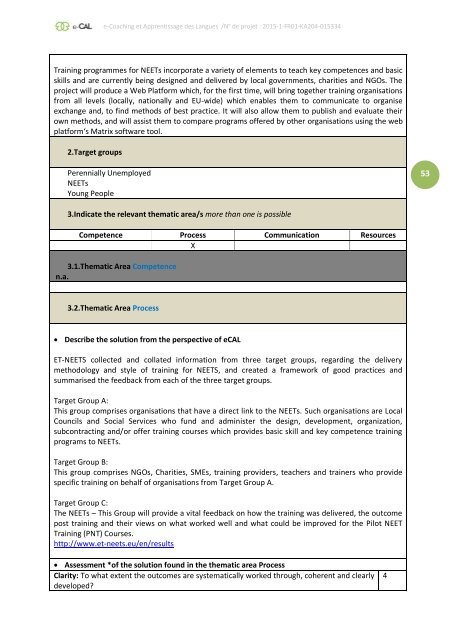e-CAL - e-Coaching et Apprentissage des Langues
The ERASMUS+ project e-CAL presents the result of an analysis of support methods in the case of language learning using web-based Open Educational Resources (OER).
The ERASMUS+ project e-CAL presents the result of an analysis of support methods in the case of language learning using web-based Open Educational Resources (OER).
Create successful ePaper yourself
Turn your PDF publications into a flip-book with our unique Google optimized e-Paper software.
e-<strong>Coaching</strong> <strong>et</strong> <strong>Apprentissage</strong> <strong>des</strong> <strong>Langues</strong> /N° de proj<strong>et</strong> : 2015-1-FR01-KA204-015334<br />
Training programmes for NEETs incorporate a vari<strong>et</strong>y of elements to teach key comp<strong>et</strong>ences and basic<br />
skills and are currently being <strong>des</strong>igned and delivered by local governments, charities and NGOs. The<br />
project will produce a Web Platform which, for the first time, will bring tog<strong>et</strong>her training organisations<br />
from all levels (locally, nationally and EU-wide) which enables them to communicate to organise<br />
exchange and, to find m<strong>et</strong>hods of best practice. It will also allow them to publish and evaluate their<br />
own m<strong>et</strong>hods, and will assist them to compare programs offered by other organisations using the web<br />
platform‘s Matrix software tool.<br />
2.Targ<strong>et</strong> groups<br />
Perennially Unemployed<br />
NEETs<br />
Young People<br />
53<br />
3.Indicate the relevant thematic area/s more than one is possible<br />
Comp<strong>et</strong>ence Process Communication Resources<br />
X<br />
3.1.Thematic Area Comp<strong>et</strong>ence<br />
n.a.<br />
3.2.Thematic Area Process<br />
Describe the solution from the perspective of e<strong>CAL</strong><br />
ET-NEETS collected and collated information from three targ<strong>et</strong> groups, regarding the delivery<br />
m<strong>et</strong>hodology and style of training for NEETS, and created a framework of good practices and<br />
summarised the feedback from each of the three targ<strong>et</strong> groups.<br />
Targ<strong>et</strong> Group A:<br />
This group comprises organisations that have a direct link to the NEETs. Such organisations are Local<br />
Councils and Social Services who fund and administer the <strong>des</strong>ign, development, organization,<br />
subcontracting and/or offer training courses which provi<strong>des</strong> basic skill and key comp<strong>et</strong>ence training<br />
programs to NEETs.<br />
Targ<strong>et</strong> Group B:<br />
This group comprises NGOs, Charities, SMEs, training providers, teachers and trainers who provide<br />
specific training on behalf of organisations from Targ<strong>et</strong> Group A.<br />
Targ<strong>et</strong> Group C:<br />
The NEETs – This Group will provide a vital feedback on how the training was delivered, the outcome<br />
post training and their views on what worked well and what could be improved for the Pilot NEET<br />
Training (PNT) Courses.<br />
http://www.<strong>et</strong>-ne<strong>et</strong>s.eu/en/results<br />
Assessment *of the solution found in the thematic area Process<br />
Clarity: To what extent the outcomes are systematically worked through, coherent and clearly<br />
developed?<br />
4


